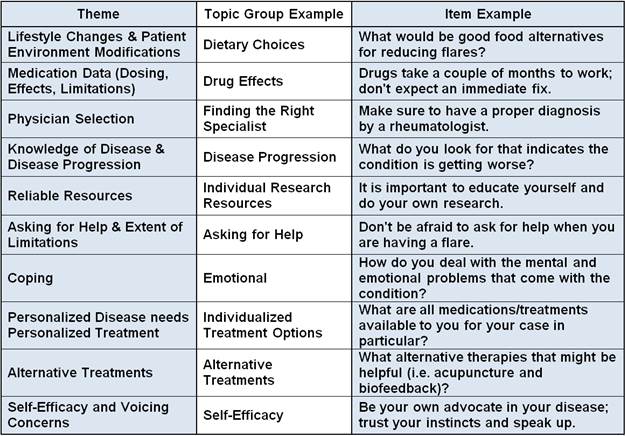Session Information
Date: Tuesday, November 10, 2015
Title: Health Services Research Poster III: Patient Reported Outcomes, Patient Education and Preferences
Session Type: ACR Poster Session C
Session Time: 9:00AM-11:00AM
Background/Purpose: While healthcare provider priorities
often coalesce around clinical concerns, little has been done to explore which concerns
are the most pressing educational concerns among the rheumatic disease patient community.
This study conducted a cross-sectional analysis elicited by rheumatic disease
patients using nominal groups to identify the set of topics most relevant to
patients regarding their disease and care. Items were rank-ordered according to
importance and used to identify the educational concerns with which rheumatic
disease patients most identify.
Methods: Participants were recruited from within
the membership registry of the rheumatology patient community, CreakyJoints, to
participate in one of four nominal groups held in June 2015. Each of the four groups
generated a set of educational topics or questions (‘items’), and then
rank-ordered them within each focus group. We manually reviewed all items to
aggregate them into common topic groups, de-duplicating redundant items, and categorizing
the topic groups in to themes according to their highest patient-ranked order.
Results: Among the 31 participants distributed
across 4 nominal groups, mean (SD) age was 52.5 (9.8) years with 94% being women.
Participant diseases included rheumatoid arthritis (74%), osteoarthritis (29%),
osteoporosis (29%), fibromyalgia (23%), lupus (16%), ankylosing spondylitis (13%),
and psoriatic arthritis (10%). Overall, 98 educational topics were suggested by
the four groups, de-duplicated to 44 unique topic groups, which then were grouped
into 14 representative themes. Themes consisted of 2-15 topic groups with each topic
group encompassing 1-8 individual items. “Lifestyle changes and patient
environment modifications” was the most valued theme, receiving 14% of votes. Medication
data (drug dosing, interactions, performance, etc.), physician selection, and knowledge
of disease/disease progression were also strongly emphasized with voting rank
scores of 12%, 11%, and 10%, respectively. Themes of least interest included friend/family/community
support, financial concerns (including insurance), and social interactions, which
held vote percentages of 3%, 2%, and 1%, respectively.
Conclusion: Patients with rheumatic diseases are concerned
about a variety of topics, which include lifestyle changes/patient environment
modifications, medication data, and physician choice. Patient-centered research
should maximally respond to addressing questions of importance to patients, and
this survey is a first step in identifying and prioritizing the topics that
matter most to patients.
Table 1: Top-ranked rheumatic disease educational
concern themes with topic group and item examples.
To cite this abstract in AMA style:
Higginbotham P, Johnson B, O'Beirne R, Safford M, Ginsberg S, Nowell B, Curtis JR. Patients’ Prioritization of Patient-Centered Education and Research Topics in Rheumatic Disease [abstract]. Arthritis Rheumatol. 2015; 67 (suppl 10). https://acrabstracts.org/abstract/patients-prioritization-of-patient-centered-education-and-research-topics-in-rheumatic-disease/. Accessed .« Back to 2015 ACR/ARHP Annual Meeting
ACR Meeting Abstracts - https://acrabstracts.org/abstract/patients-prioritization-of-patient-centered-education-and-research-topics-in-rheumatic-disease/

